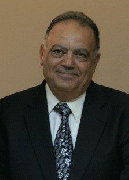DEARBORN — The FBI Detroit field office issued a statement this week reiterating the innocence of Bint Jebail Cultural Center President Ali Hammoud, calling him a “respected community leader” and stating once again that he was not the person sought by the federal government after a Friday night arrest made by Dearborn Police.

|
| Bint Jebail Cultural Center President Ali Hammoud |
Dearborn Police arrested Hammoud on Friday, Nov. 11, acting on a federal warrant for a man of the same name who was suspected of smuggling and of supporting Hizbullah.
According to Dearborn Police Chief Ron Haddad, the information sent to his department on Friday from the Law Enforcement Information Network (LEIN) as entered by federal authorities including the name, address, Michigan driver’s license number, physical description and more all matched Hammoud.
Haddad made the announcement at a press conference on Monday, saying that the police’s actions were proper in the situation. He also called it “unfortunate” and said that officers followed procedures and were courteous and professional.
Hammoud was kept in prison for about 12 hours following the wrongful arrest and was released at about 7 a.m. on Saturday.
He was also questioned by the FBI before being released, his attorney Majed Moughni said. The man the FBI had been seeking was involved in a case from 2006 and may have left the country for Lebanon.
Osama Siblani, publisher of The Arab American News, heard about the arrest late Friday evening and made phone calls early Saturday morning to FBI Special Agent in Charge Andy Arena as well as to Haddad to inform them that they had the wrong person.
Siblani said he took strong issue with the arrest of Hammoud, who is well known in the community.
“The problem is, why did the FBI know immediately that he is not the man that they want while the police took all night (to figure that out),” Siblani asked, referring to his conversation with Arena on the following morning.
“The FBI was on their way to pick him up for arraignment and then later Andy Arena called to say he’s been released and he’s not the guy we’re looking at.”
Siblani still could not believe it had happened; Hammoud also told him he felt the same way and said he is “very distressed” by the mistake and wrongful arrest.
“They should have used common sense to determine whether he was the right man or not, there are many people to check with in this community.
“That shows a lack of respect and careless behavior; once again they have proved they are not a community police force…we should not be treated like we’re under occupation, this is an extremely distressful situation.”
U.S. Sen. Debbie Stabenow (D-Michigan) also sent a letter to the Detroit FBI office asking how Hammoud could possibly have ended up on the LEIN database and wondering why it took so long to identify him. She also asked what actions the FBI, specifically the Detroit office, will now take to prevent a future, similar occurrence.
At a meeting with dozens of members of the Congress of Arab American Organizations to discuss the situation on Wednesday, November 16, Hammoud thanked Siblani, Moughni, the American-Arab Anti-Discrimination and other community members for supporting him during the ordeal, which he called a “nightmare” for him and his family.
“I was enjoying an evening dinner with my family..I was shocked and surprised to see five police officers at my house,” Hammoud said. “I tried to clarify that I am not the individual they were seeking, I said the mayor knows me and I pleaded with them that I am not the same individual.
“All I’m asking for is for authorities to be more aware so it doesn’t happen to someone else.”
Longtime community activist Alan Amen was among a virtual consensus of those at the meeting who feared such a mistake would happen again.
“This error is an indicator of the system that is being used,” he said.
Amen said that the police should have had enough info on Hammoud to prevent the arrest from occurring, but also referenced another case years ago in which local police told the ATF that they had the wrong man and yet they still insisted on taking him, suggesting the flawed nature of the system.
He worries that others who don’t have the same stature and visibility as Hammoud may end up being locked up for much longer if put in a similar situation.
Other CAAO members noted that Hammoud’s reputation may have been hurt because of initial reports linking him to the fugitive he was mistaken for.
Attorney Tarek Baydoun also noted that collective bargaining-related procedures have led to police departments hiring mainly officers from outside communities, which is a problem. The vast majority of Dearborn officers come from outside the community which oftentimes leads to problems similar to what happened with the arrest of Hammoud.
Moughni said that he believed that the long-running BRIDGES program discussing key issues with local and federal officials helped in expediting Hammoud’s release, which Siblani said was among the quickest local officials with the Attorney for the Eastern District of Michigan’s office had ever seen.
CAAO is planning another BRIDGES meeting to address issues surrounding the FBI’s LEIN system for identifying suspects with outstanding warrants and how to prevent more cases of mistaken identity from happening.






Leave a Reply